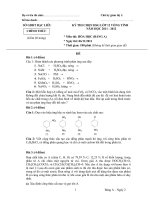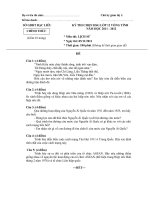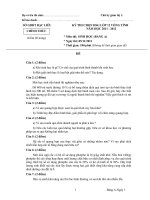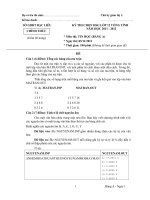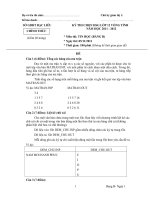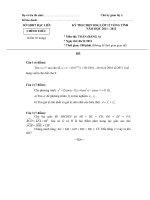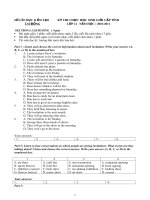ĐỀ THI CHỌN HỌC SINH GIỎI tiếng Anh lớp 12 năm 2011 (Đồng Tháp).PDF
Bạn đang xem bản rút gọn của tài liệu. Xem và tải ngay bản đầy đủ của tài liệu tại đây (318.54 KB, 14 trang )
S
GIÁO D C VÀ ðÀO T O
ð NG THÁP
_______________________________
KỲ THI CH N H C SINH GI I L P 12 THPT
C P T NH NĂM H C 2011 - 2012
________________________________________________________________________
ð THI MÔN: TI NG ANH
Ngày thi: 09/10/2011
Th i gian làm bài: 180 phút (Khơng k th i gian phát đ )
(ð thi g m có: 14 trang)
ð thi chính th c
STT do giám th ghi
H và tên thí sinh: _________________________
S báo danh: ________________Phòng thi _____
Giám th 1: ________________________
Giám th 2: ________________________
H c sinh l p _____ trư ng___________________
S phách
(Do TB ch m thi ghi)
(Ký tên - Ghi h và tên)
--------------------------------------------------------------------------------------------------------------------ði m t ng ph n
ði m bài thi
B ng s
B ng ch
H tên và ch ký
Giám kh o 1
Giám kh o 2
Câu 1:............
Câu 2:............
Câu 3:............
Câu 4:............
S phách
STT do TB
ch m thi ghi
T ng:..............
PART I. LISTENING: (3 ms)
Part A: Listen to the following conversation twice and decide whether the following
statements are true (T) or false (F). Put a cross (X) into the correct column. (1m)
TRUE
FALSE
1. Mrs. Brown first visited the town twelve years ago.
2. There was only one store on the street when she was there.
3. The market where Lien used to shop was moved to
another place.
4. Now Lien often shops in a small market next to the nice
supermarket.
5. Lien will take Mrs. Brown to shop in a floating market
next week.
Part B: Listen to the conversation twice and choose the best answer (A, B, C, or D) for each
question. (1m)
1. What is the survey that the student is doing about?
A. a university assignment
B. people’s shopping habits
C. household chores
D. supermarkets
2. How many people does the woman live with?
A. two
B. four
C. three
D. five
3. Who in her family usually goes shopping with her?
A. her husband
B. her daughter
C. her son
D. no one
4. Why does the woman always shop at this supermarket?
A. Because it is very close to her house B. Because it is much cheaper
C. Because her daughter works here
D. Because it sells almost everything
5. When does she always do the food shopping?
Thí sinh khơng đư c vi t vào ph n có g ch chéo
-------------------------------------------------------------------------------------------------------------------------------
A. on Mondays
ANSWERS:
1.
2.
B. on Wednesdays C. on Thursdays
3.
4.
D. on Fridays
5.
Part C: Listen to the man’s talk twice and complete the following statements. Write your
answers in the numbered box. (1m)
1. Up to ……………. employees will lose their jobs at local company Anglesite.
2. The company would be offering ……………. redundancy and early retirement.
3. The Managing Director was asked if these cuts were a result of Anglesite's poor
………….. over the past five years.
4. He said the job ……………… had nothing to do with the figures.
5. He said the company had …………… the way they operated their business two years before.
ANSWERS:
1.
2.
3.
4.
5.
PART II. VOCABULARY AND GRAMMAR: (7ms)
Part A: Choose the word or phrase which best completes these sentences. Write your
answers in the numbered box. (2ms)
1. The boy was ................. with a family in the countryside.
A. reared
B. bred
C. brought up
D. grown up
2. Jane came ................ a beautiful picture when she was tidying the room.
A. across
B. round
C. into
D. past
3. Until she was arrested last week, the young woman thought she had .......... the perfect crime.
A. committed
B. escaped
C. got away
D. charged
4. ............... it not been for the intolerable heat in the hall, they would have stayed much longer.
A. If
B. But
C. Should
D. Had
5. The ball ................. two or three times before rolling down the road.
A. sprang
B. bounced
C. leap
D. hopped
6. The ................. of the pagoda in the water was very clear and beautiful.
A. sight
B. shadow
C. reflection
D. mirror
7. When I came, the salesperson was ................. to the customers how to use a new kind of
washing machines.
A. demonstrating B. proving
C. exposing
D. teaching
8. Do you think Ms. Brown will ................. for Parliament in the next election?
A. sit
B. run
C. walk
D. stand
2/14
Thí sinh khơng đư c vi t vào ph n có g ch chéo
-------------------------------------------------------------------------------------------------------------------------------
9. A human being is ................. of many often conflicting desires.
A. made
B. made up
C. consisted
D. created
10. The train accident................. the other trains' departure by a few hours.
A. sent back
B. called off
C. delayed
D. retained
11. The planet Mercury ............ rotations during every two trips around the Sun.
A. three complete
B. completes three
C. the completion of three
D. completing three of the
12. Mountaineers ............ climb Mount Everest must make reservations to do so often up to seven
years in advance.
A. want to
B. they want to
C. who want
D. wanting to
13. In economics, "diminishing returns" describes ............ resource inputs and production.
A. among
B. when it is
C. among them
D. the relationship between
14. Rarely ............ remove the entire root of a dandelion because of its length and sturdiness.
A. can the casual gardener
B. the casual gardener
C. the casual gardener will
D. does the casual gardener's
15. Professional people expect ............ when it is necessary to cancel an appointment.
A. you to call them
B. that you would call them
C. your calling them
D. that you are calling them
16. Frost occurs in valleys and on low grounds ......... on adjacent hills.
A. more frequently as
B. as frequently than
C. more frequently than
D. much frequently than
17. In a new culture, many embarrassing situations occur ............ a misunderstanding.
A. for
B. of
C. because of
D. because
18. ............ unknown quantities is the task of algebra.
A. To found
B. Find
C. The find
D. Finding
19. Both liquids and gases flow freely from a container because they have ............ .
A. not definite shape
B. none definite shape
C. nothing definite shape
D. no definite shape
20. Research in the work place reveals that people work for many reasons ............ .
A. money beside B. money besides
C. beside money
D. besides money
ANSWERS:
1.
2.
3.
4.
5.
6.
7.
8.
9.
10.
11.
13.
14.
15.
16.
17.
18.
19.
20.
12.
3/14
Thí sinh khơng đư c vi t vào ph n có g ch chéo
-------------------------------------------------------------------------------------------------------------------------------
Part B: There are 10 mistakes in the following passage. Underline the wrong word and
write the right one in the right column. (0) has been done as an example. (1m)
The sun was shining quite brightly as Mrs. Grant leaves her house,
and she saw no necessity to take an umbrella with her. She got on the bus
to take herself into the town and before long it came on to rain. It had not
stopped when the bus reached at the market-place half an hour later. Mrs.
Grant stood up and absent-minded picked up the umbrella that was
hanging on the seat in front of her.
A cold voice said loudly: “That is mine, Madam!”
Suddenly remembered that she had come out without her
umbrella, Mrs. Grant blushed with embarrassment and apologized, trying
at the same time to ignore a unpleasant look the owner of the umbrella
was giving her.
When she got off the bus, Mrs. Grant made a straight for a shop
which she could buy an umbrella. She found a very pretty one and,
because it was so pretty, decided to buy other as a present for her
daughter. She did the rest of her shopping and had lunch in a café .
In the afternoon she got on the homeward bus with the two
umbrellas under her arm, and sat down. Then she saw that, with a curious
coincidence, she was sitting next to the woman who had made her feeling
so uncomfortable that morning.
This woman now looked at her, then at the umbrellas, and said: “
You have had quite a good day, I see”.
4/14
(0)….left….
1)…………………
2)…………………
3)…………………
4)…………………
5)…………………
6)…………………
7)…………………
8)…………………
9)…………………
10)………………..
Thí sinh khơng đư c vi t vào ph n có g ch chéo
-------------------------------------------------------------------------------------------------------------------------------
Part C: Change the words in capitals to fit the sentence. (0) has been done as an example.
(1.5m)
a) Usually, (0. PROFESSION) translators work from a foreign (0) professional
language into their mother tongue to reduce (1. ACCURATE) translation 1)……………….
and for better style. Much translation is of scientific or (2. COMMERCE)
2)……………….
material and this kind of work often requires an (3. UNDERSTAND) of
technical vocabulary and (4. SPECIAL) language. Not all (5. 3)……………….
TRANSLATE) are in full-time employment but those who usually work
4)……………….
for large industrial concerns or for public (6. ORGANISE). The main
personal characteristic needed to be a successful translator is a (7. 5)……………….
WILLING) to attend detail. In addition, it is (8. DESIRE) for translators
6)……………….
to know at least two foreign languages. The wider the (9. VARY) of
languages they can offer, the greater the (10. LIKELY) of the work will 7)……………….
be available.
8)……………….
b) The (11. PUBLISH) of the first atlas was in 1595. The man
who produced this collection of maps was called Gerardus Mercator. 9)……………….
Born in 1512, he spent his youth in Flanders where he became known as
10)………………
an (12. EXTREME) talented map-maker of scientific instruments. In
1544 he was briefly imprisoned for his (13. RELIGION) beliefs and, 11)……………….
fearing for his family’s safety he went to live in Rhineland, where he
12)……………….
lived for the rest of his life. His atlas was so (14. SUCCEED) that it was
translated into many European languages. However, his map of the world 13)……………….
is not (15. ACCURACY) because the earth is round. As maps are flat, it
14)……………….
is virtually impossible to have correct scale, area and direction on one
15)……………….
map.
Part D: Supply the correct form of the verb in brackets. Write your answer in the
numbered box. (1m)
I come from a very large family, and recently my parents decided that they (1.
spend) ……. long enough living in an overcrowded house in Birmingham. “We (2. move)…... to
the country”, my father (3. announce) …….. one evening. “ I have sold this house, and we (4.
live) ……… on a farm”. So last week we (5. load) ……. all our possessions into hired vans, and
for the last few days we (6. try) ……. to organise ourselves in our new home. Yesterday, for
example, my three brothers and I started painting the downstairs rooms. Unfortunately, while I (7.
5/14
Thí sinh khơng đư c vi t vào ph n có g ch chéo
-------------------------------------------------------------------------------------------------------------------------------
mix) …….. the paint, one of my sisters opened the door. Nobody had told her that we would be
in the room, you see. So instead of painting the walls, we spent all morning cleaning the paint off
the floor. But worse things (8. happen) ……… since then. This morning when I (9. wake up)
…….., water (10. drip) …………. through the ceiling next to my bed.
ANSWERS:
1)
6)
2)
7)
3)
8)
4)
9)
5)
10)
Part E: Fill in the blank space with a right preposition or an adverb particle. Write your
answers in the numbered box. (1.5ms)
A.
People who are deprived (1)…... sleep lose energy and become quick-tempered. After two
days (2)…….. sleep, a person finds that lengthy concentration becomes difficult. He can force
himself to perform tasks well for short periods, but he is easily distracted. He makes many
mistakes, especially (3)……. routine tasks, and his attention slips (4)…… times
Every‘sleepless’person experiences periods (5).…...... which he dozes off (6)……. a few seconds
or more. He completely falls asleep unless he is kept active continuously.
People who go (7)….… sleep for more than three days have great difficulty thinking,
seeing, and hearing clearly. They have periods (8)…….. hallucinations, (9)……… which they see
things that do not really exist. They also confuse daydreams with real life and lose track
(10)….… their thoughts in the middle of a sentence.
B.
11. The company has been taking……….. new staff, including part-time workers.
12. A bomb went ….. ….. near the station, but no one was injured.
13. Fish can survive for a short time …..……. water.
14. If we want to buy a house, we’ll have to cut…........ our spending.
15. Army had fainted, but we managed to bring her..………….
ANSWERS:
1)
2)
3)
4)
5)
6)
7)
8)
9)
10)
11)
12)
13)
14)
15)
6/14
Thí sinh khơng đư c vi t vào ph n có g ch chéo
-------------------------------------------------------------------------------------------------------------------------------
PART III. READING: (4 ms)
Part A: You are going to read a magazine article. Some paragraphs have been removed
from the article. Choose from the paragraphs A – E the one which fits each gap 1 – 5. (1m)
LOPES has been developed by engineers at the University of Twente in Enschede in the
Netherlands over several years. Designed for the rehabilitation clinic, it is not a mobile device but
supports the patient as they walk on a treadmill.
1
"For instance, some people cannot lift their foot up appropriately," explains Dr Edwin van
Asseldonk, who is working on the project. "What this device does is it senses that the foot is not
lifting properly.
"It then compares it with a reference pattern and then exerts a force or torque to assist that subject
in doing it."
2
The machine provides the forces to enable her to physically move her left leg and foot the way it
should move, but it also operates as a memory aid, the researchers believe.
3
"That push-up I felt and my knee lifting it is what I've forgotten. I couldn't reproduce it myself so
I had to feel it again."
4
"With stroke survivors, it's very important that they get signals to the brain but also that they
send signals downwards from the brain," he says.
5
Dr Sharlin Ahmed from The Stroke Association in the UK hopes the innovation will help.
"Mobility issues have negative effects upon stroke survivors' quality of life, so we welcome any
research or technology that will help improve mobility for stroke survivors and enable them to
have a better quality of life," she told the BBC.
A. "It's only when you get information from your legs to your brain and vice-versa that can you
hope for some plasticity in your brain."
B. Dr van Assledonk believes that by physically showing patients how to walk properly, the
machine can help them develop the brain signals required to drive improved movement
7/14
Thí sinh khơng đư c vi t vào ph n có g ch chéo
-------------------------------------------------------------------------------------------------------------------------------
C. It can do all the walking for the patient, or it can offer targeted support in either one leg or
with one element of the walking process. The machine can also detect what the patient is doing
wrong.
D. "I got a eureka moment because I felt an old feeling of how to walk normally," she recalls of
the first time she used the machine.
E. Petra Hes is one of those testing the device. She suffered a stroke aged just 17. Years of
physiotherapy have helped, but she still has what is known as a "drop foot", which means she
cannot lift and flex her left foot in the way she once did, or even remember how to do so.
Part B: Read the following passage and choose the most suitable word for each space. Write
your answers in the numbered box. (1m)
The image of science
The image that we have of science has undergone radical change in the last hundred years.
An enormous (1) ……….. explosion, together with a number of very real (2) ………. about the
environment and all the moral and political ramifications of economic growth have (3) …….. put
science at the centre of public debate.
The twentieth century began with a challenge to the (4) ……. that human knowledge was
approaching completion. It will come, perhaps, as something of a surprise to all of us to realize
that the emergence of this highly (5) ……….. process came both from within and outside science.
New scientific theories (6) ………. reveal the limitations of the old perspective. We had
thought that the world, understood through the medium of rational (7) ………, was, indeed, the
real world. Now we know that this was no more than a simplification that just happened to work.
Once we realize this, though, we can move in a number of opposing directions. We can reevaluate all knowledge (8) …….. and decide that it is eternally fragmentary and full of a vast
number of (9) ………. , or we can be more positive and view these vast explosions of scientific
awareness as new challenges still to come and as celebrations of the (10) …….. that the human
imagination has so far scaled.
1.
2.
3.
4.
5.
6.
7.
A. technological
A. anxious
A. questionably
A. assume
A. destroyed
A. overwhelmedly
A. beings
B. technology
B. anxiously
B. unquestionably
B. assumed
B. destructive
B. overwhelmed
B. being
C. techniques
C. anxieties
C. questioned
C. assuming
C. destroying
C. overwhelming
C. been
8/14
D. technologist
D. anxiety
D. questioning
D. assumption
D. destruction
D. overwhelmingly
D. to be
Thí sinh khơng đư c vi t vào ph n có g ch chéo
-------------------------------------------------------------------------------------------------------------------------------
8. A. pessimistic
9. A. perfection
10. A. heights
B. pessimisticly
B. imperfection
B. height
C. pessimistically
C. imperfections
C. high
D. pessimism
D. perfect
D. heighten
ANSWERS:
1)
2)
3)
4)
5)
6)
7)
8)
9)
10)
Part C: Read the passage and choose the correct answers. Write your answers in the
numbered box. (1m)
Alfred Bernhard Nobel, a Swedish inventor and philanthropist, bequeathed most of his
vast fortune in trust as a fund from which annual prizes could be awarded to individuals and
organizations who had achieved the greatest benefit to humanity in a particular year. Originally,
there were six classifications for outstanding contributions designated in Nobel’s will, including
chemistry, physics, physiology or medicine, literature and international peace.
The prizes are administered by the Nobel Foundation in Stockholm. In 1969, a prize for
economics endowed by the Central Bank of Sweden was added. Candidates for the prizes must
be nominated in writing a qualified authority in the filed of competition. Recipients in physics,
chemistry, and economics are selected by the Royal Swedish Academy of Sciences; and
physiology or medicine by the Caroline Institute; in literature by the Swedish Academy; and in
peace by the Norwegian Nobel Committee appointed by Norway’s parliament. The prizes are
usually in Stockholm on December 10, with the King of Sweden officiating, an appropriate
tribute Alfred Nobel on the anniversary of his death. Each one includes a gold medal, a diploma,
and a cash award of about one million dollars.
1. What does this passage mainly discuss?
A. The Nobel prizes
B. Alfred Bernhard Nobel
C. Swedish philanthropy
D. Great contributions to mankind
2. Why were the prizes named for Alfred Bernhard Nobel?
A. He won the first Nobel prize for his work in philanthropy
B. He is now living in Sweden
C. He left money in his will to establish a fund for the prizes
D. He serves as chairman of the committee to choose the recipients
3. How often are the Nobel prizes awarded?
A. Five times a year
B. Once every two years
9/14
Thí sinh khơng đư c vi t vào ph n có g ch chéo
-------------------------------------------------------------------------------------------------------------------------------
C. Once a year
D. Twice a year
4. The word “outstanding” in line 3 most closely means _______.
A. recent
B. exceptional
C. unusual
D. established
5. The word “will” in line 4 could best be replaced by _____.
A. Nobel’s wishes
B. a legal document
C. a future intention
D. a free choice
6. A Nobel prize would NOT be given to _______.
A. an author who wrote a novel
B. a doctor who discovered a vaccine
C. a diplomat who negotiated a peace
D. a composer who wrote a symphony
7. The word “one” in paragraph 2 refers to _____.
A. tribute
B. anniversary
C. candidate
D. prize
8. The word “appropriate” in the passage most closely means _______.
A. prestigious
B. suitable
C. customary
D. transitory
9. Which individual or organization serves as administrator for the trust?
A. The King of Sweden
B. The Nobel Foundation
C. The Central Bank of Sweden
D. Swedish and Norwegian academies and institutes
10. Why are the awards presented on December 10?
A. It is a tribute to the King of Sweden.
B. Alfred Bernhard Nobel died on that day.
C. That date was established in Alfred Nobel’s will.
D. The Central Bank of Sweden administers the trust
Part D: Fill in each blank with one appropriate word.
answer
work
allows
help
in reply
willing
approves
atmosphere
see
situation
which
that
realise
appreciates
makes
Human beings have a strong need to put their experiences and problems into words. That
is why everyone (1)..….... a “friendly ear”- someone who is (2)…….... to listen to their troubles
and joys. But few people (3)…….... what a complex skill listening is. To be a good listener
requires great powers of concentration, which can only be gained through practice.
There are two reasons why listening is often such hard (4)….….... The first is simply that
people much prefer to speak. How often have you missed what someone has said because you
10/14
Thí sinh khơng đư c vi t vào ph n có g ch chéo
-------------------------------------------------------------------------------------------------------------------------------
were thinking about what you were going to say (5) ….…....? The second reason is that people
speak too slowly. The average speed is about 125 words per minute, (6)…….... is not fast enough
for the human brain. It (7)…….... too much time for the concentration to fail, as the brain tries to
keep itself busy with other, irrelevant thoughts.
Next time you are in a listening (8)….…...., try to predict what the speaker is going to say.
Ask yourself questions about what is being said, and (9)….….... if the speaker answers them.
Finally, make quick summaries in your head of the main points that have been made. All of these
things will (10)…….….... you to concentrate and make you a better listener.
ANSWERS:
1)
2)
3)
4)
5)
6)
7)
8)
9)
10)
PART IV. WRITING: (6 ms)
Part A:
A.1: Complete the second sentence so that it has a similar meaning to the first sentence,
using the word given .The number in brackets indicates the required words. (1m)
1. “I saw you hit that new boy in the playground!”, the teacher told him. (acussed/5)
The teacher ........................................................................new boy in the playground.
2. Could I arrange time to see the interviewer again?
(appointment/3)
Could I .................................................................. to see the interviewer again?
3. This will be my student's first performance in Canada.
(performed/4)
This will be the first time ……………………………………….. in Canada.
4. If we tried to force him to repay the debt, we would be wasting of time. (point/5)
There was …………………………………………………………….. to repay the debt.
5. Illiteracy has been one of the causes of poverty.
(contributed/3)
Illiteracy …………………………………………… poverty.
A.2: Finish each of the following sentences in such a way that it means exactly the same as
the sentence printed before it. (1m)
1. Without your help, I wouldn’t have succeeded in my job.
11/14
Thí sinh khơng đư c vi t vào ph n có g ch chéo
-------------------------------------------------------------------------------------------------------------------------------
If .......................................................................................................................................... .
.......................................................................................................................................... .
2. It's my duty to do the household chores in my family.
I am responsible ……………………………………………………………………… .
.......................................................................................................................................... .
3. Stock brokers bought the company shares because they assumed that it was making a lot of
profit.
Had .......................................................................................................................................
......................................................................................................................................... .
4. I dislike it when people criticize me unfairly.
I object ..............................................................................................................................
.......................................................................................................................................... .
5. He was very sorry because he didn’t have time to visit all places of interest in London when he
was there last year.
He greatly ......................................................................................................................... .
.......................................................................................................................................... .
Part B: The following table shows the percentage of the Earth’s surface area and the
percentage of the world’s population for the seven continents. Write a short report
outlining the main findings of the area and the population of the continents.
Area and population of the Continents
Continents
Area
Population
Asia
30%
58%
Africa
20%
11%
North America
16%
9%
South America
12%
5%
Antarctica
9%
0%
Europe
7%
16%
Oceania
6%
1%
12/14
Thí sinh khơng đư c vi t vào ph n có g ch chéo
-------------------------------------------------------------------------------------------------------------------------------
Your writing:
Part C: Do you agree or disagree with the following statement? “In modern society, people
who can speak foreign languages have more chances to find better jobs”. Use specific
reasons and examples to support your answer.
Your writing:
13/14
Thí sinh khơng đư c vi t vào ph n có g ch chéo
-------------------------------------------------------------------------------------------------------------------------------
THE END.
14/14
